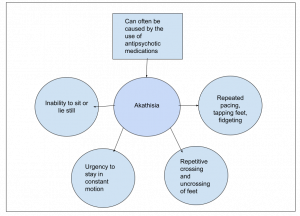Definition of Akathisia
Introduction
This is an assignment that introduces the three types of definitions (parenthetical, sentence, expanded). The definitions used are differentiated by the audience, purpose and situation. Each team member is assigned to select a specific term that is relevant to their profession to educate an audience that does not have the technical knowledge of that term.
Scenario
The reading situation for this assignment is to explain the definition of akathisia as a pharmacist to their patient who does not have prior knowledge about the condition.
Parenthetical
Akathisia (feeling of restlessness) is one of the most common side effects of certain psychiatric medications (Lohr et al., 2015).
Sentence
Akathisia is a movement disorder characterized by a persistent feeling of restlessness and desire to move that can be caused by certain psychiatric medications (Kumar., 2009).
Expanded Definition
Requirement:
Akathisia is a movement disorder that is defined as the inability to remain still. It is commonly caused by certain psychiatric medications such as antipsychotics. Akathisia is characterized by an intense feeling of restlessness or uneasiness that prevents the individual from sitting or lying still (Lohr et al., 2015). The movements are often described as being repetitive in nature such as pacing and fidgeting (Patel et al., 2022).
Etymology:
The term “akathisia” is derived from the Czech word “Akathisie” created by Ladjslav Hascovec, a Czechoslovakian neuropsychiatrist who originally based it on the Greek phrase of “not to be made to sit down.” (Lohr et al., 2015).
History:
In 1923, akathisia was first described as a psychiatric condition, but was later categorized as a movement disorder when it was discovered to be caused by antipsychotic medications in the 1950s. This caused akathisia to be grouped together with other related movement problems (Lohr et al., 2015).
Comparison and Contrast:
Restless Leg Syndrome (RLS) can often be confused with akathisia because in both conditions, there is an urgency to move (Qureshi et al. 2019). There are three key features that differentiate the two conditions. Individuals with RLS have the symptoms of paresthesias, which are abnormal sensations such as the feeling of burning, prickly, or numbness in the legs (Qureshi et al. 2019). Secondly, unlike RLS, which symptoms worsen at night and at bedtime, akathisia is not associated with sleep (Qureshi et al. 2019). Lastly, the symptoms of RLS improve with movement. In contrast, movement does not improve the urgency to move in akathisia (Qureshi et al. 2019).
Visual:
Figure 1.
Symptoms and Common Cause of Akathisia

Note. Diagram indicating general type of medications and symptoms related to akathisia
Figure 2.
Moving Feet

Note: By Bergen, J. (https://flic.kr/p/4DEz69)
Akathisia, as represented as a diagram in figure 1 and an image of moving feet in figure 2 (Bergen, 2008), is often a side effect caused by psychiatric medications such as antipsychotics used to help patients manage specific behavioural or mood disorders (Patel et al., 2022). Akathisia is often induced by medications to treat schizophrenia or other psychiatric conditions and can be mitigated by dose reductions or medication changes (Lohr et al., 2015).
References
Bergen, J. (2008, March 3). Moving Feet. Flickr. Retrieved February 13, 2023, from https://flic.kr/p/4DEz69
Kumar, R. & Sachdev, P. S. (2009). Akathisia and second-generation antipsychotic drugs. Current Opinion in Psychiatry, 22 (3), 293-299. doi: 10.1097/YCO.0b013e32832a16da.
Lohr, J., Eidt, C., Abdulrazzaq Alfaraj, A., & Soliman, M. (2015). The clinical challenges of akathisia. CNS Spectrums, 20(S1), 1-16. doi:10.1017/S1092852915000838
Patel, J., & Marwaha, R. (2022, July 25). Akathisia – StatPearls – NCBI Bookshelf. StatPearls [Internet]. Retrieved February 7, 2023, from https://www.ncbi.nlm.nih.gov/books/NBK519543/
Qureshi, A., Khurshid, K.A. (2019). Is This Akathisia or Restless Legs?. In: Khawaja, I., Hurwitz, T. (eds) Comorbid Sleep and Psychiatric Disorders. Springer, Cham. https://doi.org/10.1007/978-3-030-11772-6_20
Leave a Reply